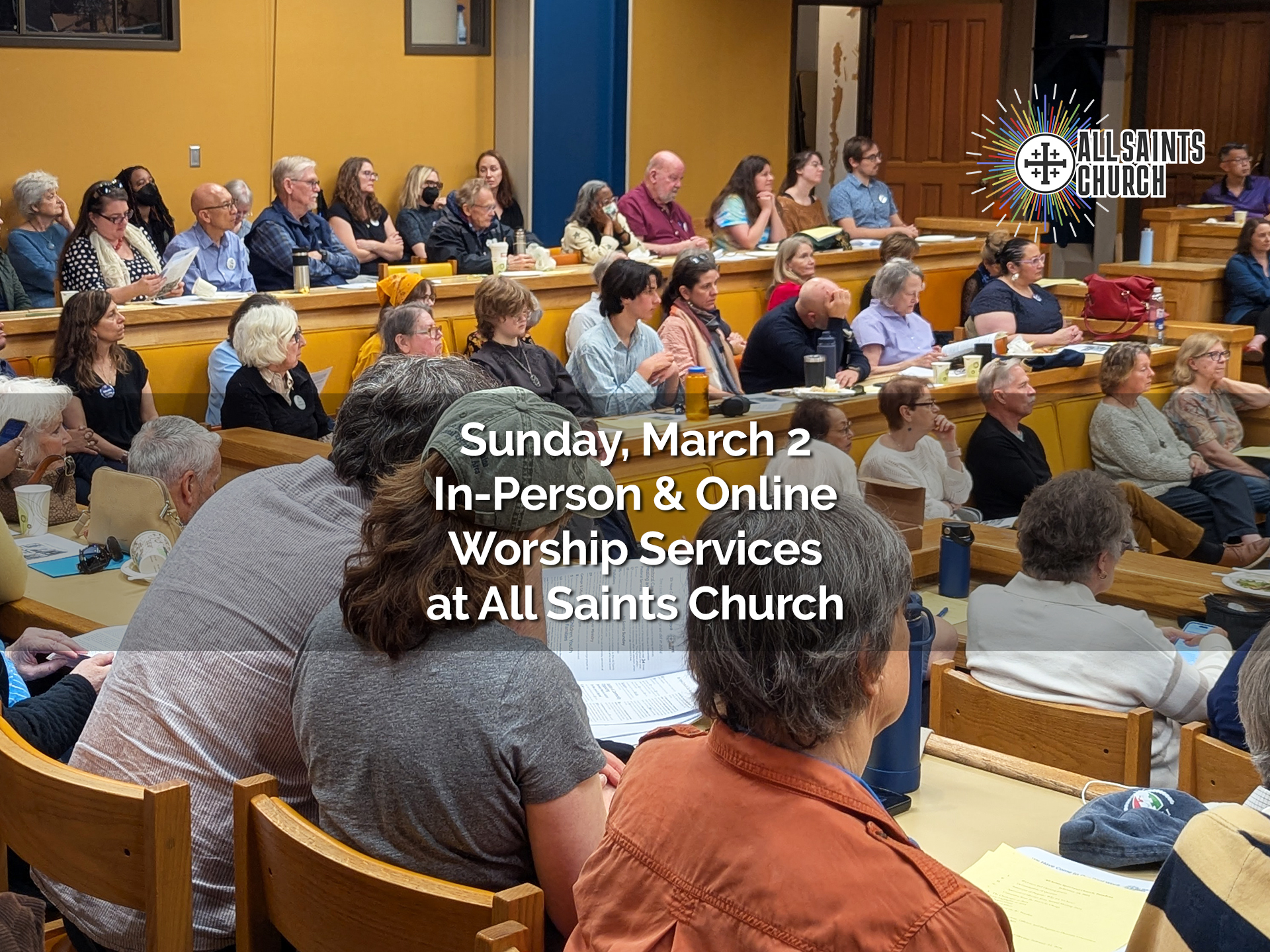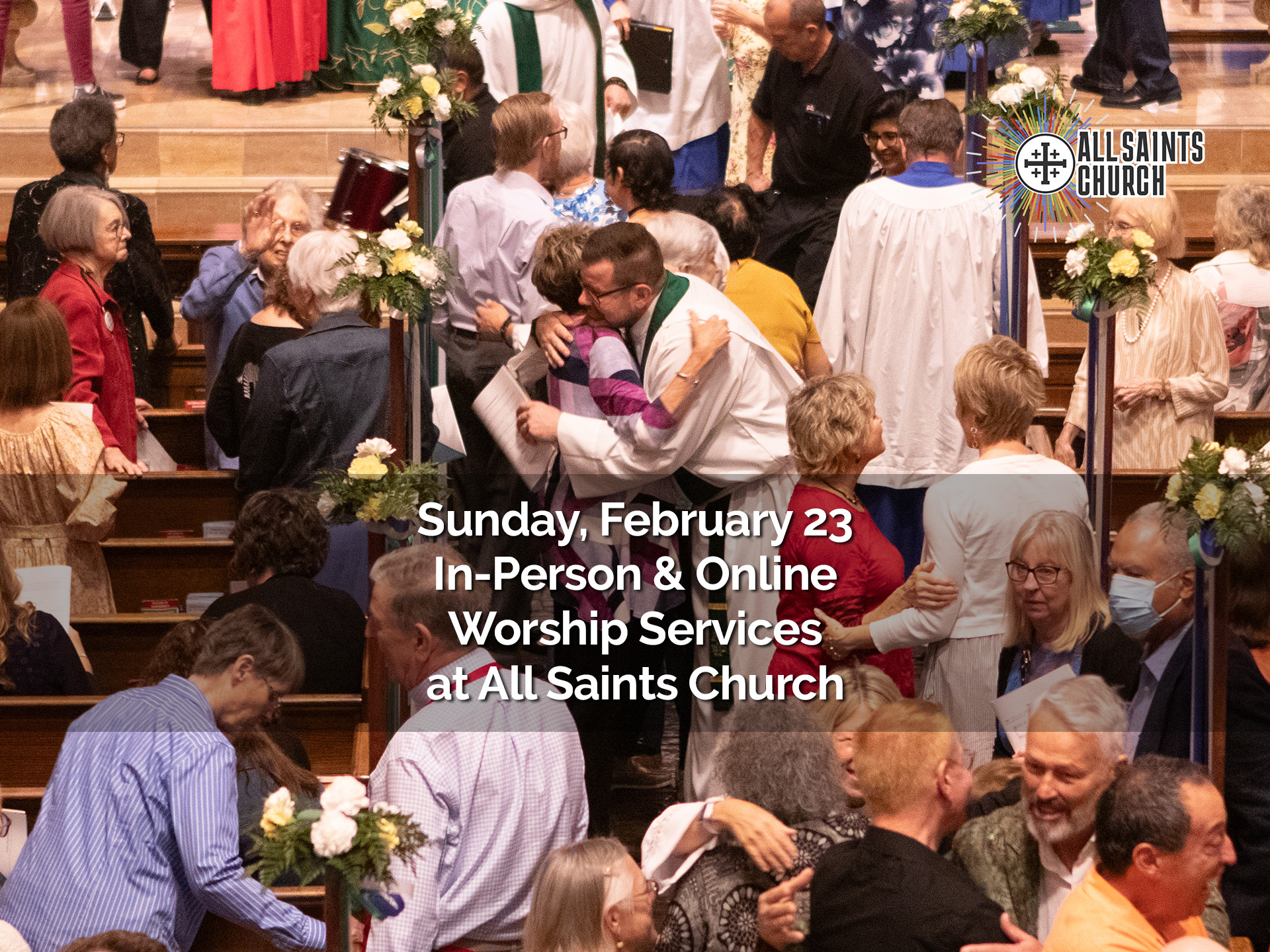by Dr. Josslyn Luckett, All Saints Church Jazz Vespers | March 17, 2019
It’s been so powerful and moving to think deeply with and about Mahalia’s music these last few weeks in anticipation of this sacred gathering. I would suggest as a Lenten practice taking on as much of Mahalia as you can. I have tried to narrow my reflections to two of her songs:
“I’m Going to Live the Life I Sing About in my Song” and “How I Got Over.”
When you get home tonight, google footage of Mahalia singing, “How I Got Over,” at the March on Washington in 1963, to see her joy, her sense of sacred arrival. Her smile–wide enough so the 249,000th person at the back of the Mall could witness her witness. Oh and please take note of the way she danced with that lyric, improvising, singing how WE got over, instead of I, how did WE MAKE IT OVER? Her loving glances at her friend Dr. King who was about to make his historic address.
She had first sung for him in 1956, in Montgomery, before the end of the bus boycott (on that occasion the much more somber “I’ve Heard of a City Called Heaven” and because it was Christmas time, “Silent Night”…which turned out to be particularly ironic as they left the event to find that Ralph Abernathy’s home had been bombed).
But, in Washington D.C, seven years later, her soul must have looked back and wondered…how did they make it over?
How did she make it over?
Born in New Orleans in 1911.
Her mother died when she was 5, but she was raised by an Aunt Duke who was an herbal healer possibly a conjure woman.i
She was also raised by a musical community, inside the church and on the streets outside that church, that gave her sonic grounding, sounds that were themselves demonstrations of sonic genius of a people who had survived the wilderness of the middle passage and were surviving somehow still the long Jim Crow.
I know now that a great influence in my life was the Sanctified or Holiness Churches we had in the South…. Those people had no choir and no organ. They used the drum, the cymbal, the tambourine, and the steel triangle…. They had a beat, a powerful beat, a rhythm we held on to from slavery days … I believe the blues and jazz and even the rock and roll stuff got their beat from the Sanctified Church.ii
When Mahalia moved north to Chicago at 16 her singing style wasn’t always appreciated…it was too loose, she moved her body too much, she was told she was going to have to “stop (all that) hollering.”iii Mahalia described it like this:
Coming up North, a lot of people have questioned me about . . . the way I sing these religious songs. But I’ve heard ’em being rendered this way from a child. So that’s why maybe a lot of the songs that I sing, they might think it sounds [like] jazz because the jazz musicians played it. But it was something I heard from a little bitty girl on up to this day. The type of music that I’m talking about was known to [all the] New Orleans people after they had buried their deceased and, the . . . second line. . . . That type of music is really in my soul.iv
So, beyond the March on Washington rendition of “How I got Over,” I was listening to another recording of the song, also live, and in it I heard what felt like an answer to folk who said she had to stop all that hollering. After a good 4 or 5 minutes of the traditional verses of the songs, Mahalia gets introspective, gets well lent like, describing a very intimate, not quite a dark night of the soul, but more like a bright night and morning of the soul:
The lyrics suddenly go like this:
All night long God kept his angels watching over me
Early this morning God told his angels
God said ‘touch her in my name’
God said ‘touch her in my name’
I rose this morning
I rose this morning…
I feel like shouting
I feel like shouting
I feel like shouting
I feel like shouting
I feel like shouting
I feel like shouting
I feel like shouting (yes she sings it 7 times)
I just got to thank god
For being so good to me……
Watching footage of Mahalia live, another thing I notice and love is her size. She was not a small woman. I love seeing her sweat, her hair that could not stay in place no matter the manner of products she likely applied. She lets loose. The indwelling of that spirit is too full in her to be presented in polite renderings,
She felt like shouting, she felt like shouting.
Mahalia is on record many times explaining that Bessie Smith was one of her favorite singers and she tried very hard as a young girl to imitate her vocal styling. Mahalia has said about the blues:
When black people stop singing the blues, then there’ll be no more nothin! Because the blues has made American music. I know the blues and the gospel, and they will still be around when all the rock and stuff has gone. The blues is always around.v
I stress this because even as we gather this evening as a group of lovers of jazz and many of us also lovers of Jesus, there are still plenty folk out there who want to suggest that sacred music is one thing and blues and jazz are something else…secular, profane, even the devils music…
This is when I find the work of theologian, Dr. James Cone so helpful, his writing on the spirituals and the blues where he thinks of the blues as secular spirituals: “I contend that the blues and the spirituals flow from the same bedrock of experience, and neither is an adequate interpretation of black life without the commentary of the other.”vi
I see in Mahalia as the gathering of so many black music traditions from that holiness stomp, to that New Orleans second line, to that Chicago Gospel blues.
“I’m Going to Live the Life I Sing about in my Song”… just meditate on that kind of spiritual integrity: I’m going to live the life I sing about in my song. It’s like she’s saying: I’m going to gather all of these parts, these sounds and songs, and call them blessed, and pass them forward from my voice and this big, grown, and grateful body that supports it, to bless others every day with this gift I’ve been given. On Monday, I walk on, on Tuesday, lord I keep walking on, all of my parts, all of my musical influences, all of my hurt and my victories, I keep walking on…. Oh to be so whole! To come through the wilderness and deliver sounds of wholeness and healing like that!
Professor Emeritus of Princeton Theological Seminary, Dr Peter Paris describes improvisation as a moral virtue in his book, The Spirituality of African Peoples:
“Improvisation expresses not only the agent’s creativity and spontaneity, but also his or her spirit of perceptive wholeness. By keeping the old and new close at hand, the virtue of improvisation embraces and enhances the whole and thus serves to promote and preserve the goal of community…. The converse of the virtue of improvisation is rigidity, fixity…dogmatism, all of which connote an incapacity for creativity and an insensitivity to the psychic needs of oppressed people.”vii
How do we make it over?
How do we move through the wilderness of doubt, of despair, of oppressive systems that tell us not to holler?
As one kind of answer, I look to Mahalia, I listen and take to heart when she sings,
I’m going to live the life I sing about in my song,
I’m gonna stand for right, always showing the wrong
If I’m in the crowd,
if I’m alone
on the streets
or in my home
I’m gonna live the life I sing about in my song
This Lenten season has always hit me as a time to really get quiet and check in in this way that Mahalia is asking us to do. Is my walk matching my talk? Do I have the courage to speak what I say at home out loud, in a crowd? On the street? Am I allowed to shout when I feel like shouting, I feel like shouting. Before and until the troubles of this world are done, how do I walk and talk on Monday and Tuesday and everyday with integrity, standing for right? Serving the goal of perceptive wholeness and community? I’m not sure how…but I know it’s going to take sweat. I know from Mahalia, it’s going to take courage and a real faith that the exact way that the spirit is moving through you, moving you to speak and to sing in your original voice just might be enough, might even be more than enough….
I want to thank my brother Jason for reading those exquisite words by Rosemarie Feeney Harding so beautifully.
She’s someone who made the reverse migration of Mahalia. She was born in Chicago and there met and married Vincent Harding (who you may know as the co-writer of King’s famous “Beyond Vietnam” sermon in 1967). The Hardings moved down to Georgia from Chicago in 1960 to establish the “Mennonite House” an interracial voluntary service unit, community gathering place, and retreat space for activists. Though her husband Vincent was more well known for his alliance with MLK, Rosemarie was also an activist and scholar. At the time of her death she was compiling her writings with her daughter, Rachel (Harding also a scholar of religion) who was in awe of her mother’s ability to feed and protect her “philosophical approach to life that connected her powerfully and intimately to her own source of supply—which was both ancestral and cosmic.”viii
Though her ancestors had lived with/through many terrors, Rachel says her mother and her mother’s people knew that terror was not God’s final say…
There is enough
There is no end to grace
And we are all instruments of grace
The more we give it
The more we share it
The more we use it, the more god makes
There is no scarcity…
There is plenty and always moreix
In this Lenten season may we be gifted with the clarity of Rosemarie, the courage of Mahalia to walk through and on from the wilderness in faith, in love, with improvising spirits committed to perceptive wholeness and community, knowing that God’s grace never ends. Amen.
Josslyn Luckett pictured above with Tammy McCann [photo: Christina Honchell]
iSee Johari Jabir, “On Conjuring Mahalia: Mahalia Jackson, New Orleans, and the Sanctified Swing,” American Quarterly, Vol. 61, No. 3, In the Wake of Katrina: New Paradigms and Social Visions (Sep., 2009), pp. 649-669.
iiMahalia Jackson quoted in Jabir, ibid, 650.
iiiMellonee V. Burnim, “Voices of Women in Gospel: Resisting Representations,” in Issues in African American Music: Power, Gender, Race, Representation(New York: Routledge, 2017), 201-215.
ivMahalia Jackson quoted in Burnim, ibid, 207
vMahalia Jackson, quoted in Jabir, 657.
viJames Cone, The Spirituals and the Blues: An Interpretation(New York: Seabury Press, 1972).
viiPeter J Paris, The Spirituality of African Peoples: The Search for a Common Moral Discourse(Minneapolis: Fortress Press, 1995) 147-148.
viiiRosemarie Freeney Harding, Remnants: A Memoir of Spirit, Activism, and Mothering, with Rachel Elizabeth Harding (Durham: Duke University Press, 2015), xiv.
ixHarding, ibid, ix.



